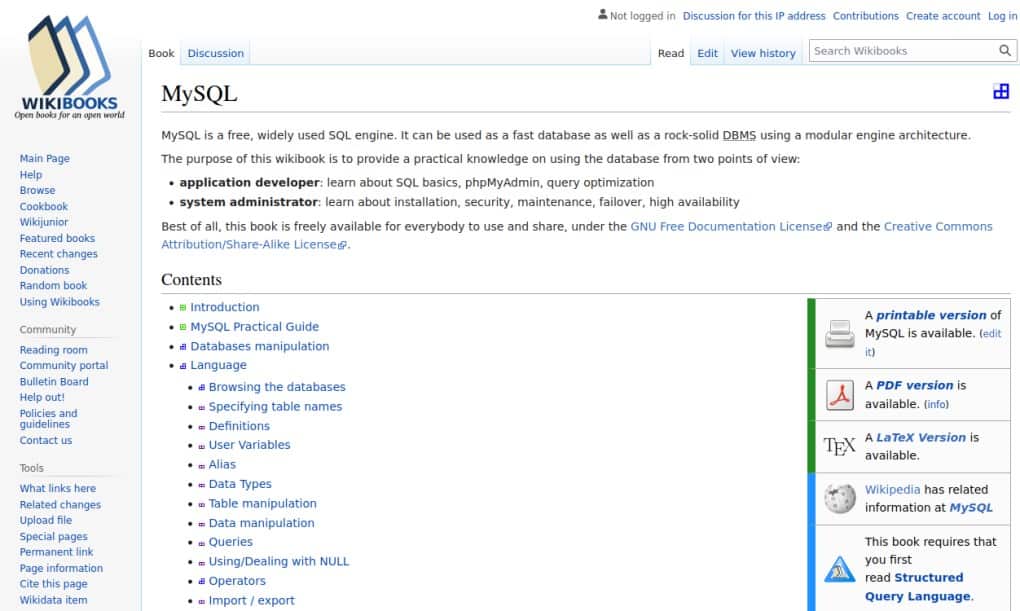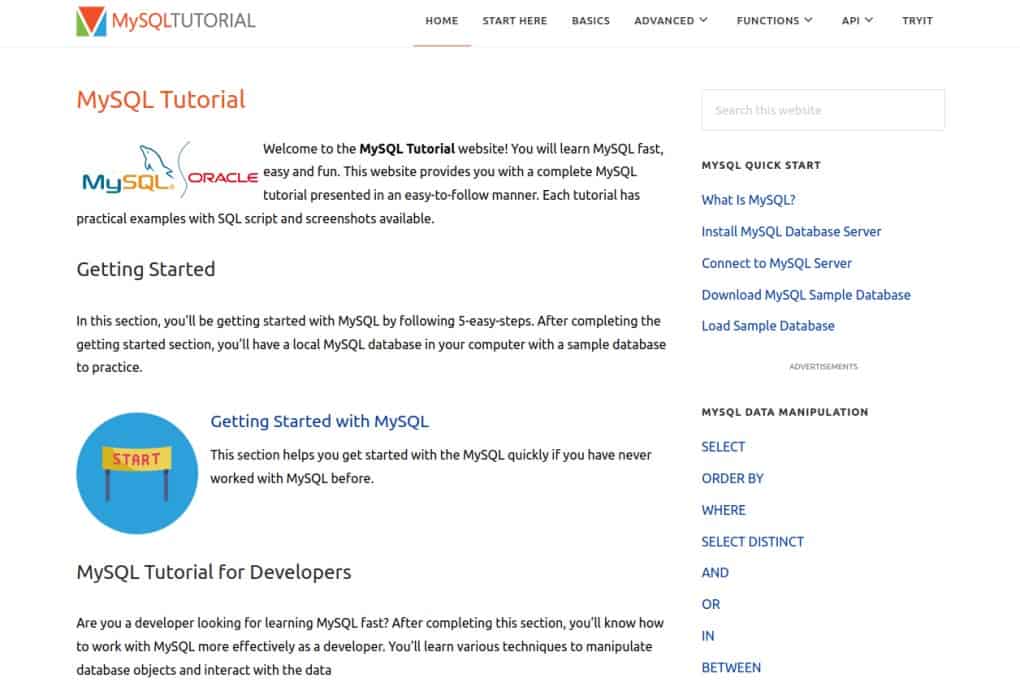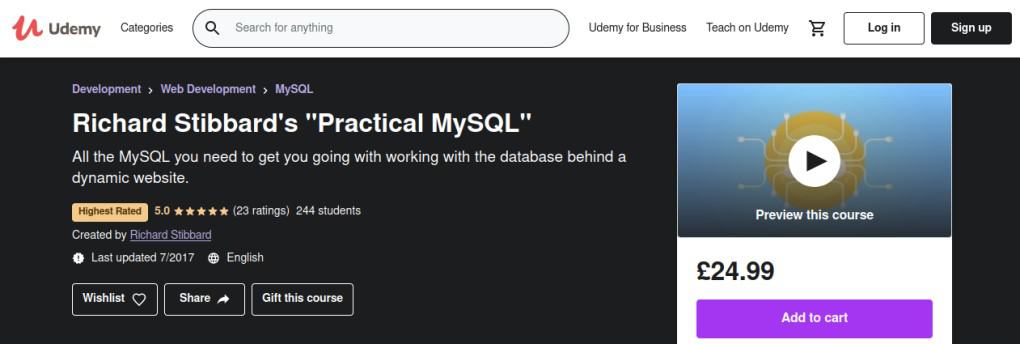
How to Learn MySQL
Do you ever wonder how large-scale applications store data? The scale of such applications requires powerful data storage set-ups, and reliable DBMS solutions to easily handle large volumes of operations. MySQL is one such DBMS solution — it helps store and operate on structured data easily.
In this guide, we’re going to talk about how to learn MySQL and what resources you can use to master it.
What You Need to Know About MySQL
MySQL is a relational database management system with varied possibilities of use. It is a full-fledged database management solution, with powerful querying capabilities. MySQL is considered one of the most user-friendly variants of SQL and unlike PostgreSQL which is an object-relation database, MySQL is a fully relational database. This means it does not contain complexities like table inheritance and function overloading. Some of the key concepts that you will need to learn on your journey to learning MySQL are:
- Queries. One of the most important reasons why any SQL-based database management standard is popular is its powerful querying capabilities. Queries are an integral part of any application that uses the MySQL database.
- Join. MySQL stores data structured in tables. These tables are then related to each other via some logical relation. To view the related data that is stored across multiple tables, you can perform joins. They are the backbone of relational databases as they help in viewing and organizing data in a useful manner.
- Views. Apart from storing and querying data, you might also need to build views on top of it. These are not permanent tables, rather they are a virtual, custom combination/modification of existing data.
- Events. As there is data, there will be updates and modifications. Events help in getting notified about any such change/update that happens to the stored data. You can then define your application logic to respond appropriately to the changes.
- Functions. To reinforce the way data is stored and modified, you can define and use functions in MySQL. These functions can be used for a wide range of use-cases, from preprocessing input data to parsing/formatting output data.
These are only a few of the many things the technology offers. As you learn more about MySQL, you’ll become aware of more things you can use to help speed up your application’s development.
Skills Needed to Learn MySQL
To learn MySQL, you should have a basic understanding of database management.
You certainly do not need to be an expert in databases to understand MySQL, but having a preliminary understanding of the concept will help you easily get started. Having prior experience with any other database management solution is a bonus.
Why You Should Learn MySQL
If you are looking to get into software development, you need to know how to store data in applications. MySQL is one of the most common tools for storing application data, so it is an added advantage if you know how MySQL works to build applications faster.
Due to its powerful querying capabilities and organized structure, it is easy to store and operate on large volumes of data. Considering the huge community backing MySQL, it is only wise to start your SQL journey using this technology.
How Long Does It Take to Learn MySQL?
The answer to this question depends on where you currently stand in database management. If you have some prior experience in databases, one to two weeks should be sufficient to master the concepts in MySQL. If not, you can expect a time of two to three weeks to cover the topics in all its depth.
All in all, you can expect to devote four to six hours daily for a period of four to six weeks to get a good grip on the language. Mastering any programming language is no easy task, and the same goes for MySQL. To start building real-life applications with MySQL, you can expect to spend about two to three months working on the ins and outs of the language.
Learning MySQL: A Study Guide
You will find plenty of MySQL learning resources online. With so much information available, you may be wondering where exactly you should start. We have compiled a list of five learning resources to help you learn what you need to know about the MySQL platform.
Wikibooks: MySQL

- Resource Type: Written Tutorial
- Price: Free
- Prerequisites: None
The MySQL Wikibook is a great way to test if MySQL is going to be a great fit for you. The Wikibook has a collection of chapters on the language’s concepts. The tutorial covers topics ranging from basic ones like querying and updating data to advanced ones like debugging a faulty script.
MySQL Tutorial

- Resource Type: Written Tutorial
- Price: Free
- Prerequisites: None
The MySQL Tutorial is the perfect way to start your MySQL journey. The tutorial has a collection of independent articles on all of the solution’s concepts, grouped under conceptual groups — data manipulation and data definition.
In the end, the tutorial contains a section that lists tutorials written keeping top programming languages in mind. This helps in getting a quick start with database integration along the way.
‘High Performance MySQL’
- Resource Type: Book
- Price: $24.35 (Amazon)
- Prerequisites: None
This book takes a beginner-first approach and is a popular choice for developers who are completely new to the idea of SQL-based databases. Written in an easy language, this book is a great option for learning MySQL from scratch. It aims at developing SQL-friendly thinking in readers, which means that once you are done with this book, you will learn how to think in MySQL
‘MySQL (Developer’s Library)’
- Resource Type: Book
- Price: $8.81 (Amazon)
- Prerequisites: None
This book focuses on teaching MySQL to learners from scratch and is a great resource to take if you are completely new to the world of SQL-based databases. This makes the course a perfect starter for people who love to understand the “why” behind a technology before diving right into it.
MySQL is used as the medium of showing practical examples for theoretical concepts explained by this course. Any other functional programming language can interchangeably be used, but the use of MySQL adds nice icing to the cake.
Richard Stibbard’s “Practical MySQL”

- Resource Type: Video Course
- Platform: Udemy
- Price: $24.99
- Prerequisites: None
Practical MySQL is a great video resource to take if you are not a fan of written tutorials or books. It features more than 6 hours of on-demand content on the subject. It begins with the basics of MySQL and introduces PHP at an early stage to help learners grasp a practical understanding of the database solution.
Communities for People Studying MySQL
Communities are an excellent resource for anyone who wants to learn MySQL. By joining a community, you can quickly find help. You can also learn more about how other people use MySQL, which may inform how you use the tool.
Below is a list of some communities for people learning MySQL that you may want to look at for more details:
MySQL Forums
MySQL has a dedicated list of forums for users to ask and answer questions. The platform also contains a list of tools, connectors, and other resources. This serves as a great reference point for folks who are new to the technology and are looking for a targeted platform for resolving their queries, either by real user interaction or documentation of any kind.
MySQL Community on Youth4Work
The Youth4Work community is moderated by the folks at Youth4Work. It is a forum where professionals of all experience levels can discuss their queries and get answers to their questions. It is a good alternative to use when the official community is unable to resolve your queries.
How Hard is It to Learn MySQL?
MySQL is an easy DBMS solution to start using. You could feasibly put together a simple application with a data store using MySQL within the very first week of learning. But to build more complex applications and write advanced queries, you will need to devote a month or two to understand the fundamentals of the technology.
Additional features like views and functions may not be needed very frequently, but it is worthwhile to learn them as well, as they add a layer of security and ease of development to your software development process.
Will Learning MySQL Help Me Find a Job?
MySQL is a highly sought-after database skill in the technology industry. Employers hiring for software development & database administration positions often list MySQL as an essential skill or an important qualification. To help you understand the value of learning MySQL for your career, we have compiled a few job and salary statistics.
- Salaries. PayScale reports that jobs that involve MySQL pay, on average, $71,934 per year. Positions that use this skill include software engineer, software developer, PHP developer, and database administrators.
- Industry Growth. According to the U.S. Bureau of Labor Statistics, software developer positions will grow at a rate of 22% between 2019 and 2029. While not all of these positions will use MySQL, a considerable number of these professionals are likely to use relational database management systems similar to MySQL.
Conclusion: Should You Learn MySQL?
MySQL is a relational database management system that makes it easy for developers to connect their applications with a robust and scalable data store. Using MySQL, developers can create large-scale applications rapidly.
MySQL is useful no matter what path in software development you aim to pursue. It helps you to shift focus from database management to your application development with its superior simple and easy to learn APIs. Its powerful querying capabilities make sure that your application does not miss out on making the best use of data.
With ever-growing salaries, strong career growth projections, and a relatively easy learning curve, MySQL holds the potential to add a lot of value to your career.


